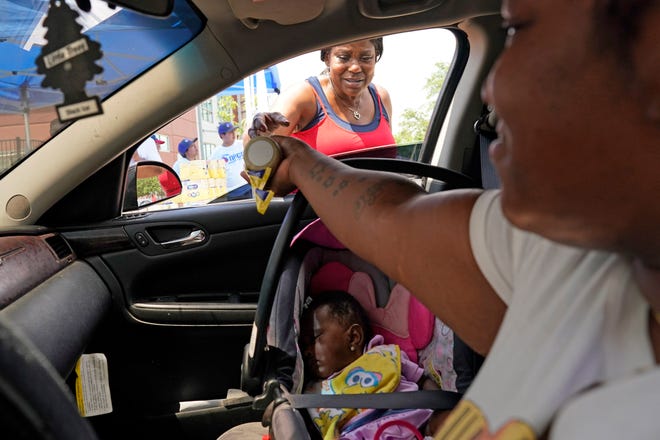Fact check: Baby formula conspiracy theory based on falsehoods
The claim: Baby formula shortage occurred within two weeks of Pfizer saying not to breastfeed and Bill Gates promoting artificial breast milk technology
As parents continue to struggle with a severe shortage of baby formula in the U.S., a May 11 tweet has gone viral for noting events purportedly related to infant feeding. It reads:
Pfizer says do not breast feed.
Baby formula runs scarce.
Bill Gates promotes new artificial breast milk technology.
All within 2 weeks.
The tweet gained about 30,000 retweets and 79,000 likes in a matter of days, and dozens of Facebook users shared screenshots of the post about COVID-19 vaccine developer Pfizer and billionaire Microsoft founder Bill Gates.
“Just a coincidence, nothing going on here,” reads one iteration of the claim in a Facebook post from Just Another Anarchy Page, which was shared more than 700 times in two weeks.
Baby formula 101:Everything you need to know during the baby formula shortage
Yet two out of three of the events comprising this “coincidence” didn’t happen in the first place.
Pfizer did not discourage breastfeeding in recent weeks, despite a persistent rumor claiming it did. And while a fund founded by Gates invested in an artificial breastmilk startup in 2020, Gates himself has never promoted the company. The product is not on the market and will not be for several years.
Follow us on Facebook! Like our page to get updates throughout the day on our latest debunks
USA TODAY reached out to Jones and other users who shared the claim for comment.

Pfizer didn’t tell women to avoid breastfeeding
The formula shortage began with supply chain issues late last year, but it was significantly worsened when suspected bacterial contamination caused major producer Abbott Nutrition to halt production for several weeks while undergoing an investigation by the Food & Drug Administration.
The post suggests the shortage of breastmilk alternatives coincided with a warning against breastfeeding from Pfizer. But there’s no evidence this is true.
Pfizer did not release any such statement in recent months, USA TODAY found. Users who shared the claim did not provide evidence to support it.
Fact check: Third-party sellers on Canadian Amazon can ship baby formula to U.S. customers
The rumor likely stems from viral but false claims that a document supposedly from Pfizer said breastfeeding mothers should not take the vaccine.
As USA TODAY reported, the document these claims were based on was not written by Pfizer and does not include recent information. Instead, it was published by a U.K. government agency in December 2020, before data on the reaction of pregnant and breastfeeding women to the vaccine were available.
Fact check:Nursing newborns are not having reactions to COVID-19 vaccine
Vaccination has been found safe for mothers-to-be and nursing newborns, as USA TODAY has reported.

Gates’ fund invested in Biomilq long before the shortage, and Gates has not publicly promoted the company
Contrary to the post’s claim, Gates has not publicly promoted an artificial breastmilk technology company in recent weeks, according to USA TODAY’s searches of news articles about Gates as well as his Twitter feed.
Gates is indirectly invested in artificial breastmilk startup BIOMILQ via Breakthrough Energy Ventures, a climate-change-focused investment firm that Gates founded in 2016, as USA TODAY reported.
The fund invested $3.5 million in BIOMILQ in late 2020, long before the baby formula shortage began.
BIOMILQ is a small part of Breakthrough Energy’s portfolio. The fund has raised more than $2 billion and invested in more than 50 companies since its founding, its website says. And the company is unlikely to benefit from the timing of baby formula shortage given its stage of development.
Fact check:False claim that states are sending free baby formula to Similac, Enfamil callers
Co-founder Leila Strickland told CNN this month that it will still take at least three to five years to obtain regulatory approval and bring the product to market. Formulas like Similac, on the other hand, are expected to reach shelves in around six to eight weeks.
Our rating: False
Based on our research, we rate FALSE the claim that the current baby formula shortage occurred within two weeks of Pfizer saying not to breastfeed and Gates promoting artificial breast milk technology. There is an ongoing baby formula shortage, as the claim suggests, but it’s not true that the other two events occurred within any two-week span. Pfizer did not recently recommend that women avoid breastfeeding, and the “new artificial breast milk technology” in which Bill Gates invested several years ago will not be on the market for another three to five years. We found no evidence Gates has publicly promoted it, recently or otherwise.
Our fact-check sources:
- Associated Press, May 18, Biden invokes Defense Production Act to boost baby formula production
- Breakthrough Energy, accessed May 18, Our Story
- Bill Gates, accessed May 18, Twitter profile
- CNBC, June 16, 2020, Bill Gates’ climate-change investment firm bets on lab-produced breast milk
- CNN, May 3, Lab-grown ‘human milk’ may be just three years away
- Pfizer.com, accessed May 19, Search
- USA TODAY, May 20, Fact check: No, document doesn’t show Pfizer warning against vaccine for breastfeeding women
- USA TODAY, Dec. 12, 2016, The new Captain Planet? Bill Gates starts $1B fund on climate change
- USA TODAY, April 9, 2021, Fact check: Nursing newborns are not having reactions to COVID-19 vaccine
- USA TODAY, Dec. 13, 2021, Fact check: No evidence Pfizer, Moderna COVID-19 vaccines cause miscarriage
- USA TODAY, May 12, White House moves to curb baby formula shortage but says unsure when parents could see relief
- USA TODAY, May 17, FDA reaches deal with Abbott to reopen baby formula factory; how long until it’s back on shelves?
- USA TODAY, May 24, Fact check: Third-party sellers on Canadian Amazon can ship baby formula to U.S. customers
- USA TODAY, May 23, Fact check: No, manufactured and homemade baby formula are not the same
- USA TODAY, May 20, Fact check: Image of boxes in warehouse unrelated to baby formula shortage
- USA TODAY, May 19, Fact check: No, goat’s milk is not a substitute for baby formula, experts say
- USA TODAY, May 18, Fact check: False claim that states are sending free baby formula to Similac, Enfamil callers
Thank you for supporting our journalism. You can subscribe to our print edition, ad-free app or electronic newspaper replica here.
Our fact-check work is supported in part by a grant from Facebook.


